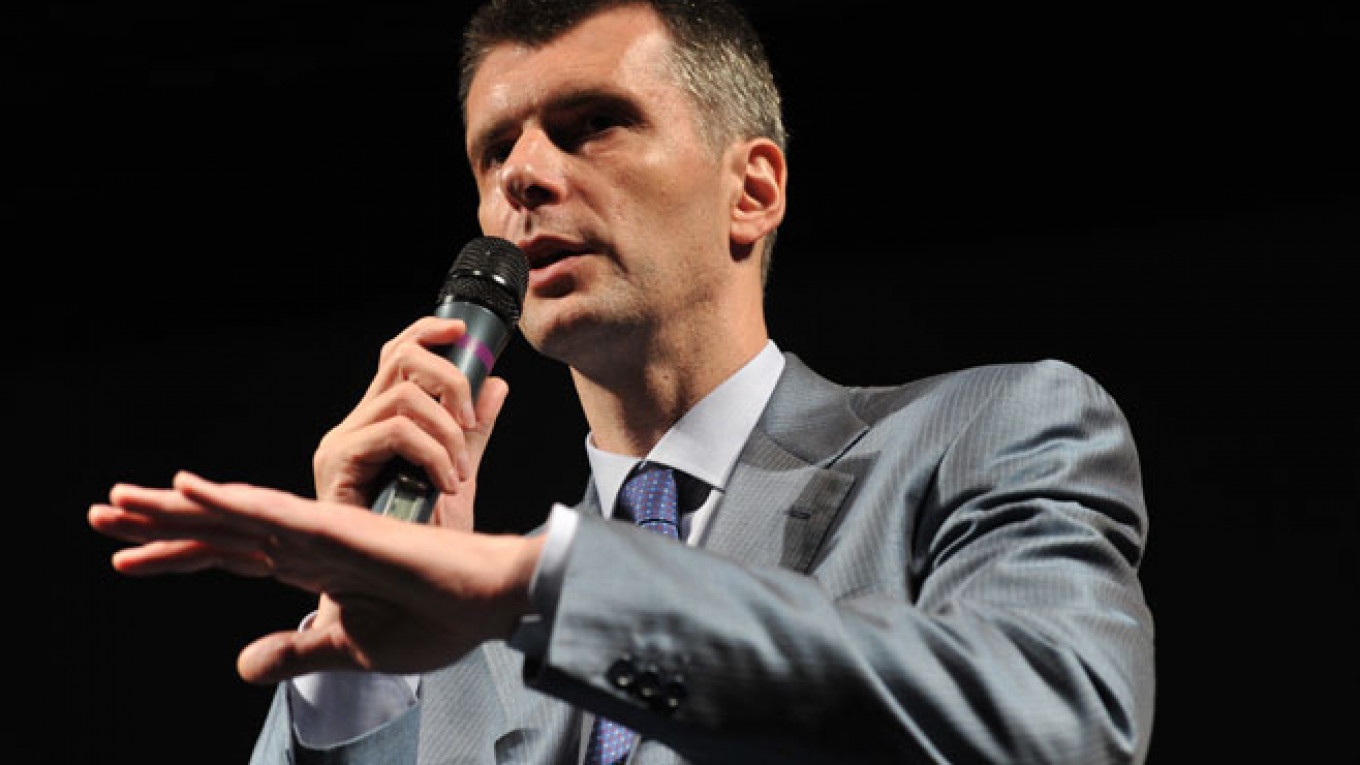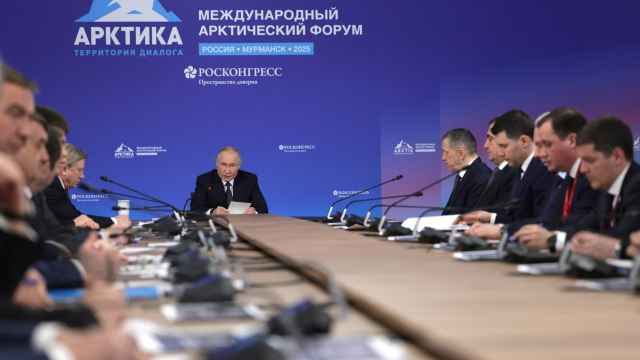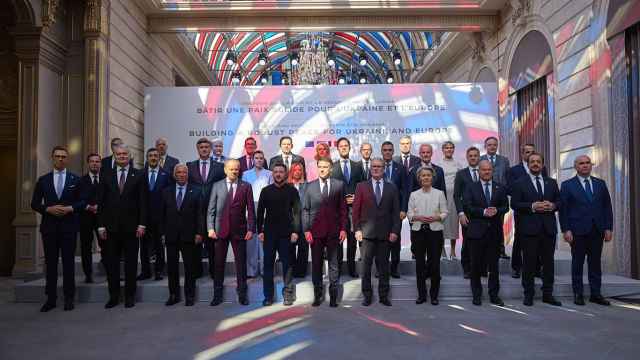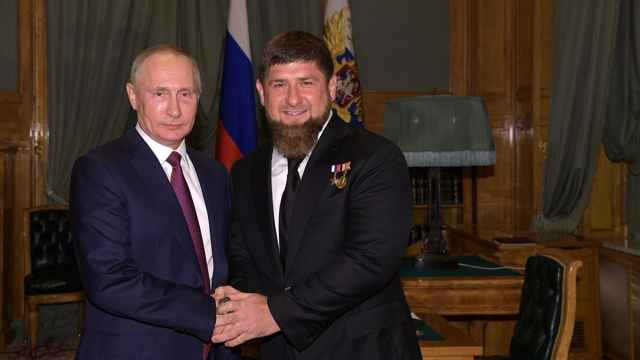Dmitry Kiselyov, the notorious Kremlin propagandist, gives the camera time to zoom in on the RBC newspaper he has just plucked from a nearby table in a casual, but evidently rehearsed, gesture.
The leading article features a large photo of Russian President Vladimir Putin. RBC is the only Russian newspaper to have dedicated an entire front page to the Panama Papers revelations that have incriminated Putin's inner circle in an alleged money laundering scheme.
"The Americans have helpers around the world, and Russia is no exception — people who are prepared to link Putin personally to offshore companies in whatever way they can," says Kiselyov. "What a delusion!"
In hindsight, Kiselyov's broadcast on the Vesti Nedeli (News Week) program on state television now seems like the sounding of a war gong on RBC's billionaire owner Mikhail Prokhorov. Four days after the broadcast, while Putin was fielding questions on his annual call-in show, Federal Security Service (FSB) officials and tax inspectors raided the central Moscow headquarters of Prokhorov's holding company Onexim Group. Raids were also conducted at several other businesses controlled by Prokhorov, including his investment firm Renaissance Capital, power generating company Quadra and the International Financial Club (IFC) bank.
The FSB said in a later statement that the raids had been conducted as part of a criminal investigation into Tavrichesky Bank, which was bailed out last year by the IFC, in which Onexim has a stake. It added that tax law violations had been found at "a number of commercial structures" but did not specify the companies' names.
The scope and force of the raids have set the rumor mill spinning. In Russia, such searches of companies belonging to tycoons have a history of ending in prison sentences or asset grabs. The former owner of Russia's first independent television channel NTV, Vladimir Gusinsky, was forced into exile following raids linked to reported suspicions of fraud and a hostile takeover of his company. And former-Yukos CEO Mikhail Khodorkovsky, once Russia's richest man, spent more than a decade in jail on tax evasion and embezzlement charges.
Both men had breached a deal with the then-newly installed president to stay out of politics. Prokhorov, however, never took any major political gambles. Though he ran against Putin in 2012, coming in third, it was an open secret that his had been a Kremlin-sanctioned electoral bid.
The 50-year-old billionaire entrepreneur's only visible political liability seems to be RBC. Aside from the Panama Papers, the news outlet has reported on various issues that could be embarrassing to the Kremlin, including an investigation into the business interests of Kirill Shamalov, Putin's reported son-in-law, and, more recently, a report claiming Putin's so-called direct line with the Russian public had been meticulously rehearsed. With most Russian media toeing the Kremlin line, RBC's bold reporting stands out.
"RBC is very careful and is relatively constrained [in its coverage]," says Igor Yakovenko, the former head of the Union of Russian Journalists. "But in the current desert, [RBC] provides an oasis of relatively independent information."
The liberal Dozhd television channel has cited two unidentified sources inside RBC as saying that the raids were an attempt to force Prokhorov to sell RBC Media holding — the media group which includes the flagship RBC newspaper and television station.
But if asked by the Kremlin, Prokhorov would give up RBC, just as he did his fledgling political career, without much resistance, another source familiar with the situation told The Moscow Times. "Prokhorov has proposed giving [RBC] away a hundred times," says the source, who asked not to be identified. "But [the Kremlin] says: 'No,' keep it, we don't have the cash, and we can't be bothered with it."
A source close to RBC's upper management told The Moscow Times there was no indication there were any serious plans to sell. The Kremlin this week denied all involvement in the raids or attempts to influence RBC's editorial policy.
Just Business?
That the raids might be connected to other business interests seems to be supported by several broadcasts by the privately-owned television channel REN-TV in the days preceding the searches. REN-TV alleged Prokhorov was using Quadra — in which Prokhorov has a majority share — to syphon funds offshore. The broadcast also accused Prokhorov's RBC of airing other people's dirty laundry while turning a blind eye to its owner's offshore activities, in an underhand stab at the newspaper's coverage of the Panama Papers and possible jab at Prokhorov's hold over Quadra.
As Russia's economy flounders, rival entrepreneurs are employing more aggressive tactics to get their hands on a shrinking pie. Late last week, a Moscow court prolonged the house arrest of Domodedovo Airport owner Dmitry Kamenshchik in what could be an attempt to force him to cede control of his business to a rival party.
Prokhorov's current net worth is $8.2 billion, making him Russia's 13th richest businessman, according to Forbes magazine. A former jeans stone-washing entrepreneur who experienced a meteoric ascent to wealth in the privatization era of the 1990s, he now owns stakes in some of Russia's largest companies, including metal giants Uralkali and RusAl — making him a lucrative target.
Meanwhile, it is still unclear how the storm raging around Prokhorov has impacted the RBC newsroom. The Reuters news agency reported on Thursday that RBC editor-in-chief Elizaveta Osetinskaya was leaving on a sabbatical four months earlier than planned, in a surprise move that, according to an unidentified source, could be related to pressure from the Kremlin.
But RBC Media's offices have not been searched and the RBC source told The Moscow Times there have been no direct attempts to interfere with editorial policy.
"With no instructions to the contrary, we continue to do what we've always done," the source said.
Contact the author at e.hartog@imedia.ru. Follow the author on Twitter at @EvaHartog
A Message from The Moscow Times:
Dear readers,
We are facing unprecedented challenges. Russia's Prosecutor General's Office has designated The Moscow Times as an "undesirable" organization, criminalizing our work and putting our staff at risk of prosecution. This follows our earlier unjust labeling as a "foreign agent."
These actions are direct attempts to silence independent journalism in Russia. The authorities claim our work "discredits the decisions of the Russian leadership." We see things differently: we strive to provide accurate, unbiased reporting on Russia.
We, the journalists of The Moscow Times, refuse to be silenced. But to continue our work, we need your help.
Your support, no matter how small, makes a world of difference. If you can, please support us monthly starting from just $2. It's quick to set up, and every contribution makes a significant impact.
By supporting The Moscow Times, you're defending open, independent journalism in the face of repression. Thank you for standing with us.
Remind me later.






